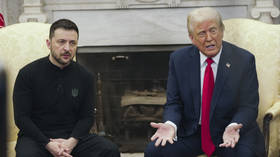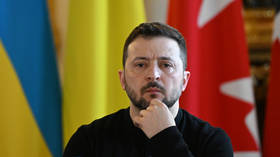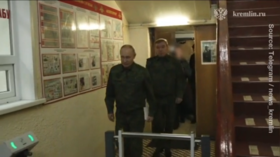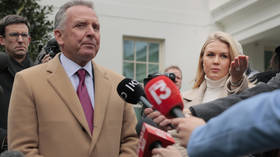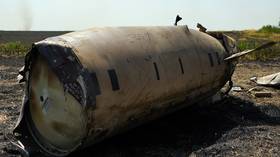Cold War lessons the United States has forgotten

Twenty years ago on a ship in the Mediterranean Sea, US and Soviet leaders formally acknowledged the end of the Cold War. But how much has the world really changed?
In early December 1989, just weeks after the Berlin Wall was dismantled, then-US President George H.W. Bush met with Soviet Chairman Mikhail Gorbachev aboard a ship in the Mediterranean Sea to do something that would have seemed impossible just weeks earlier: announce the end of the Cold War.
Speaking at a joint news conference, the Soviet leader announced there would be no “hot war” with the United States:
"The world is leaving one epoch and entering another," Gorbachev announced to a stunned world. We are at the beginning of a long road to a lasting, peaceful era. The threat of force, mistrust, psychological and ideological struggle should all be things of the past."
In reply, President Bush said:
"We can realize a lasting peace and transform the East-West relationship to one of enduring co-operation. That is the future that Chairman Gorbachev and I began right here in Malta."
“Malta was the place where we said we no longer considered each other enemies,” Gorbachev commented years later. “A sentence had been passed on the Cold War.”
Today, on the 20th anniversary of the Cold War’s demise, it may be a good time to reflect on how far we have come since those days when the world lived in constant fear of a thermonuclear war erupting between the two global superpowers.
Although the almost unimaginable threat of nuclear war has been dramatically reduced, there are other looming global issues that our Cold War experience should have better prepared us for, but apparently has not. Are we doomed to repeat history because we have forgotten it?
Here are five modern problems that our experience in the Cold War should have pre-empted.
I. Afghanistan
The Soviet-Afghan War was a nine-year conflict (1979-1989) that pitted the Soviet Red Army against the Islamic Mujahidin. This war, which has been dubbed the Soviets’ Vietnam, contributed much to the ultimate demise of the Soviet Union.
After the war in Afghanistan ended, the Soviet Union released casualty figures: over 13,000 soldiers had lost their lives in the conflict, while it has been estimated that hundreds of thousands were injured, some maimed for life.
The similarities between the tragic Soviet experience and America’s efforts today are already well known: The Soviet strategy, much like America’s present program of “nation-building,” was designed to stabilize Afghanistan’s communist government with the help of local leaders, supported by the military assistance of the Red Army. But after eight years of fighting, the Mujahidin, assisted by the brutal terrain of a country that has been rightly dubbed “the graveyard of empires,” handed the once-formidable Red Army their greatest defeat.
Today, US President Barack Obama, the unlucky inheritor of two war fronts from his Republican predecessor, has just called up another 30,000 US troops to fight against Taliban forces in Afghanistan. The American president attached an expiration date to the increasingly unpopular military mission, but that was more of a political move to save his political life, as opposed to a strategy to win a war.
Indeed, after eight years of fighting, an allied victory in Afghanistan appears to be just as elusive as it did when hostilities commenced on Oct. 7, 2001.
Briefly, US and NATO forces are attempting to train Afghan nationals and fight alongside them against the Taliban. But it is proving to be a risky business: At the beginning of November, five British soldiers were shot dead after a “rogue” Afghan policeman turned a heavy machinegun against a British training team inside a checkpoint in Helmand Province, Afghanistan.
The very same week, US Major Malik Nadal Hasan, a Muslim who had in the past criticized US military activities in Iraq, opened fire at the Fort Hood Army base in Texas, killing 12 fellow American soldiers and wounding dozens. It is exactly this sort of phony loyalty to the allied cause that presents the greatest challenge to victory in Afghanistan.
“Without the absolute loyalty of the Afghan people,” as one UK soldier recently returned from Afghanistan said, “our cause will be practically impossible to achieve.”
America’s war in Afghanistan, which is part and parcel of the short-sighted “war on terror,” was designed with “nation building” and “spreading democracy” in mind. Such an ambitious mission necessarily implies a sense of moral superiority and righteousness on the part of the liberators. But it is exactly on the moral front that American forces are suffering the most today.
Although America looks slightly less hypocritical with Barack Obama at the helm, it will take many more minority presidents to wash away the dark legacy of the Bush years.
II. The end of history and the last “evil empire”?
Ronald Reagan famously labeled the Soviet Union an “evil empire,” complete with its GULAGs, dissidents and a disturbing lack of hyper stores and hyper consumers. But a brief look at the way the US is pursuing its war on terror, complete with its own Guantanamo GULAG (which continues to perform its illegal functions despite grand promises made by Barack Obama on his campaign trail), torture and the abuse of civil liberties at home.
“President Obama will miss his self-imposed January 22 deadline to close down the military detention center at Guantanamo Bay,” Time magazine reported last month. The article went on to say that a majority of the detainees, who lack all legal representation, face the grim prospects of “indefinite detention.”
“Up to 90 suspected terrorists could face indefinite detention,” Time reported. “A Bush tactic sharply criticized by human-rights activists and also by Obama himself during his presidential campaign.”
The very existence of a place like Guantanamo Bay detention camp undermines any lofty ambitions that Washington may have had for spreading democratic ideals across a benighted planet.
The human rights organization Human Rights Watch criticized the Bush administration in its 2003 world report, stating: “Washington has ignored human rights standards in its own treatment of terrorism suspects. It has refused to apply the Geneva Conventions to prisoners of war from Afghanistan, and has misused the designation of 'illegal combatant' to apply to criminal suspects on U.S. soil.”
On May 25, 2005, Amnesty International released its annual report, calling the facility the “GULAG of our times.” Is it possible that Washington could fall from grace so soon after the collapse of the Soviet Union? Has the “land of liberty” been poisoned by the contaminated well of absolute power?
A New York Times editorial on June 5, 2005 argued that Guantanamo is part of “a chain of shadowy detention camps that includes Abu Ghraib in Iraq, the military prison at Bagram Air Base in Afghanistan and other secret locations run by the intelligence agencies” which are “part of a tightly linked global detention system with no accountability in law.”
As of November 2009, 215 prisoners were still being detained at Guantanamo Bay.
Meanwhile, America is still struggling with its smudged global image since it was revealed that US secret service agencies had been operating an “extraordinary rendition program” that involved sending detainees from the war on terror to secret “black site” detention camps for interrogation and detainment.
“The European parliament has approved a damning report on secret CIA flights, condemning member states which colluded in the operations,” the BBC reported in February, 2007. “The UK, Germany and Italy were among 14 states which allowed the US to forcibly remove terror suspects, lawmakers said.”
The exact locations of these democratic dungeons, by the way, has never been determined
In light of these very disturbing trends (which hopefully represent nothing more than a temporary loss of sanity on the part of Washington), it does not require a great stretch of the imagination to suggest that the Soviet Union may not be the last political system to win the title of “evil empire.” We can hope and pray that it was, but we would be fools to think that something equally sinister could not appear on the international stage once again, and maybe even in the one place where we would least expect it: the world’s most popular democracy, which is now the greatest spender on military hardware in the world.
III. Arms proliferation
Although the end of the Cold War signaled a new dawn for peace, 20 years on, the international community is still full of angst thanks to our refusal to give up the habit of stockpiling weapons of every variety.
“Many politicians of my generation sincerely believed that with the end of the Cold War, humankind could finally forget the absurdity of the arms race, dispense with dangerous regional conflicts, abandon sterile ideological disputes and enter a golden century of collective security,” Mikhail Gorbachev, leader of the Soviet Union from 1985 to 1991, wrote in the Vancouver province newspaper in November.
“While we politicians from the last century can be proud of the fact that we avoided the danger of a thermonuclear war, for many millions of people around the globe the world has not become a safer place,” Gorbachev continued. “Quite the contrary, innumerable local conflicts and ethnic and religious wars, along with terrorism, have appeared like a curse on the new map of world politics, creating large numbers of victims.”
Gorbachev then accused modern politicians of “acting irresponsibly,” arguing that governments are spending more on defense now than during the height of the Cold War
“The new generation of politicians is acting irresponsibly. Defense spending by numerous large and small countries alike is now greater than during the Cold War.”
And despite the cessation of tensions created by the Cold War, the United States and Russia continue to produce the machines of warfare at a breathtaking rate. Indeed, the era of trillion-dollar military budgets is already here.
“Weapons of mass destruction are proliferating, and the erstwhile adversaries of the Cold War still compete to reach new technological levels in arms production,” Gorbachev wrote.
Indeed, the mass production of military weapons has become an integral part of the economy. Today, any politician that dares to slash military spending risks not only damaging his or her home economy, but giving the political opposition the ability to argue that the nation has become somehow weakened by the reduction.
For the 2009 fiscal year, the budget of the Department of Defense soared to $518.3 billion. On top of this, emergency discretionary spending brings the sum to $651.2 billion. But it doesn’t stop there. Defense-related expenditures outside of the Department of Defense constitute between $274 billion and $493 billion in additional spending, bringing the total for defense spending to between $925 billion and $1.14 trillion for 2009 alone.
And then there are the sales of military weapons to other governments.
As Reuters recently reported, quoting a Pentagon official: “U.S. government-to-government arms sales are on track to total as much as $40 billion in fiscal 2009, up from a bumper $36.4 billion last year, despite a sharp drop in oil prices that typically tracks with reduced demand.”
Meanwhile, there is a very real risk that US spending on two war fronts will eventually break the bank.
“By the end of 2008, the U.S. had spent approximately $900 billion in direct costs on the Iraq and Afghanistan Wars,” according to the Center for Strategic and Budgetary Assessments.
“Indirect costs such as interest on the additional debt and incremental costs of caring for the more than 33,000 wounded borne by the Veterans Administration are additional. Some experts estimate these indirect costs will eventually exceed the direct costs.”
Incredibly, the United States spends, according to the latest government estimates (adjusted to current inflation rates), 43 percent more annually on defense expenditures than it did at the time of the Cuban Missile Crisis in 1962.
IV. Economy
Was the Soviet Union too big of a project to fail? Some would certainly answer yes. But fail it did, despite the fact that Mikhail Gorbachev did everything in his power to forestall the inevitable.
In July 1991, the Soviet leader traveled to London and basked in the limelight that he usually received overseas. At the US Embassy, he met with George H.W. Bush and hammered out the details of another arms limitation treaty. But for the Soviet economy, the most pressing issue was to get funds to keep the big red machine running.
Gorbachev asked the leading capitalist nations for massive loans. Despite the smiles and handshakes, they refused his request. After all, economies can not survive on government handouts, which is basically the main assumption behind the free market economy.
But just last year the global economy, responding to a massive financial crisis in the United States, falls into a deep recession. Economists told us it was the worst economic collapse since the Great Depression. Trillions of dollars were lost on the stock market as one company after another announced either insolvency or severe financial problems.
Suddenly, the United States was faced with a difficult decision: should it allow hundreds of banks and businesses go belly-up, or should it intervene in the free markets with a rescue package? For the presidential administration of Barack Obama, the latter option was adopted.
According to US government documents, the U.S. government and U.S. Federal Reserve have committed $13.9 trillion to battling the economic crisis; as of June 2009, $6.8 trillion has already been invested or spent. It does not take an economist to argue that such government involvement in the economy has very little in common with free market principles. Indeed, it could even be called Socialism.
Now the United States is presented with a unenviable scenario. First, there is a very real chance that by artificially supporting hundreds of major companies and banking institutions inflation will become uncontainable. More than one economist has predicted the end of the US dollar’s rule as the world’s reserve currency.
But most importantly, by deciding to intervene on behalf of failed businesses, many of which had proven ineffectual, the United States has basically gone against the advice it gave to Gorbachev in London back in the summer of 1991: Don’t try to prop up something that is damaged at its very foundation.
Russia, no longer part of the Soviet Union, was forced to go back to the drawing board and redesign itself. Today, it could be said that Russia, despite some big problems that it is aware of, is on the road to recovery.
Meanwhile, the United States, by opting to save major institutions that were deemed “too big to fail,” is traveling down a road without the slightest idea where it may be heading. There may be fields of gold ahead, or a precipice. Nobody has the slightest idea.
V. Environment
Last but not least is the environment, which may have the last laugh as far as we self-important humans are concerned.
The question is: have we learned to tame our destructive behavior towards the planet and its fragile ecosystem since the end of the Cold War?
The question seems like a pertinent one since a damaged environment played no small role in bringing about the demise of the Soviet Union. It could bring about our demise as well.
On April 26, 1986 at 01:23 a.m. reactor number four at the Chernobyl plant, located near Prypiat in the Ukrainian Soviet Socialist Republic, exploded. It is considered to be the worst nuclear power plant accident in history and the only level 7 event on the International Nuclear Event Scale.
The radioactive dust cloud that followed in the explosion’s wake drifted over large parts of the western Soviet Union, the European continent, with some nuclear rain reported as far away as Ireland. Large areas in Ukraine, Belarus, and Russia were severely contaminated, resulting in the evacuation and resettlement of almost half a million people.
Today, many climatologists are claiming that the planet is under threat by an entirely different menace, but equally threatening to life: global warming. But many people refuse to heed the warnings, arguing that the planet is simply passing through a normal cyclical phase (which could actually be true).
Moreover, the United States is the world's leading contributor to global greenhouse gases. But to reduce these huge amounts would mean making sacrifices at a time when the US economy is just getting out of the forest of crisis. Thus, it should come as no surprise that many American commentators, many of a "conservative" tilt and sponsored by multinational corporations, dispute the findings of the global climatologists.
Yet how to explain the melting glaciers, dying coral reefs, wild weather patterns and entire islands that are now sinking below a rising sea level. Although there is no space in this article to consider both sides of the heated debate, one thing seems irrefutable, at least to this one observer: By continuing to pump carbon dioxide into the earth’s atmosphere, something must give somewhere. Yes, the planet gives off its own huge amount of global warming gases, but the anthropogenic daily contribution is something the earth never had to deal with before.
So, like the Soviet authorities did when Chernobyl exploded, we can choose to ignore the dark cloud of global warming hanging over our heads and hope that it just goes away, or we can change our lifestyles. The issue presents human beings with a huge gamble, and the stakes have become nothing less than life itself. Whatever we decide on its behalf will have eternal consequences, affecting many generations of humans and other life on earth.
We can afford to be wrong about the economy, and political systems, but we cannot afford to be wrong about global warming. After all, we've only got one planet.




